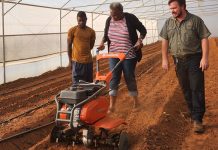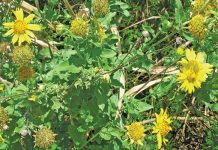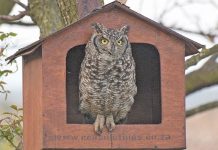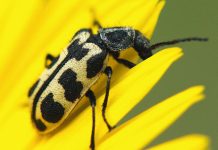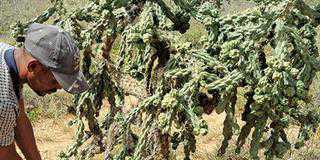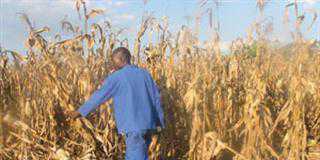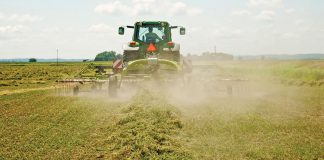During the off-season, spotted wilt and other viruses may remain in weeds. From there, insect vectors transmit them to your vegetables. Therefore, look out for weedy patches around buildings and field verges and get rid of them. These weeds may be slow-growing, so you may need extra herbicide if going the chemical route. You’ll also find that the weeds take a surprisingly long time to die.
Virus hosts can survive cold
Severe cold may help farmers by killing off weeds. However, many host weeds for viruses are cold-resistant. The small mallow (Malva parviflora) takes the cold in its stride, as do birdseed (Lepidium africanum), thistles and Gnapalium.
Aphids are not put off by the cold. In fact, the cabbage aphid is even more active during the cooler season, when its predators slow down. Plants with advanced aphid infestation may need hand-spraying. Direct the insecticide as deeply into the plant as possible, and try to get as much as you can under the outer leaves. There is usually more labour to spare at this time of the year, so it is worthwhile removing the odd infected plant (which is probably not worth harvesting in any case). It may seem that small pockets of aphids under older leaves aren’t doing enough damage to warrant spraying. However, as with mosquitoes, the real danger is not the physical damage the pest does but the disease that it transmits. If one virus-infected plant has aphids, the infection may pass to many others.
Talk to your neighbours
Where neighbours also plant susceptible crops, it is mutually beneficial to discuss this subject: bugs don’t consider boundaries. I know of cases where spotted wilt and cauliflower mosaic virus kept circulating between farms until the farmers finally co-operated.
Don’t delay the clean-up for too long: ideally, risky weeds and bugs should be wiped out before the spring crops go in. A little effort now can make a huge difference later on. For years, one of my clients had trouble with spotted wilt on his peppers. Last season he removed weeds early on, and had hardly any problem at all. – Bill Kerr
Contact Bill Kerr on (016) 366 0616 or e-mail [email protected]

